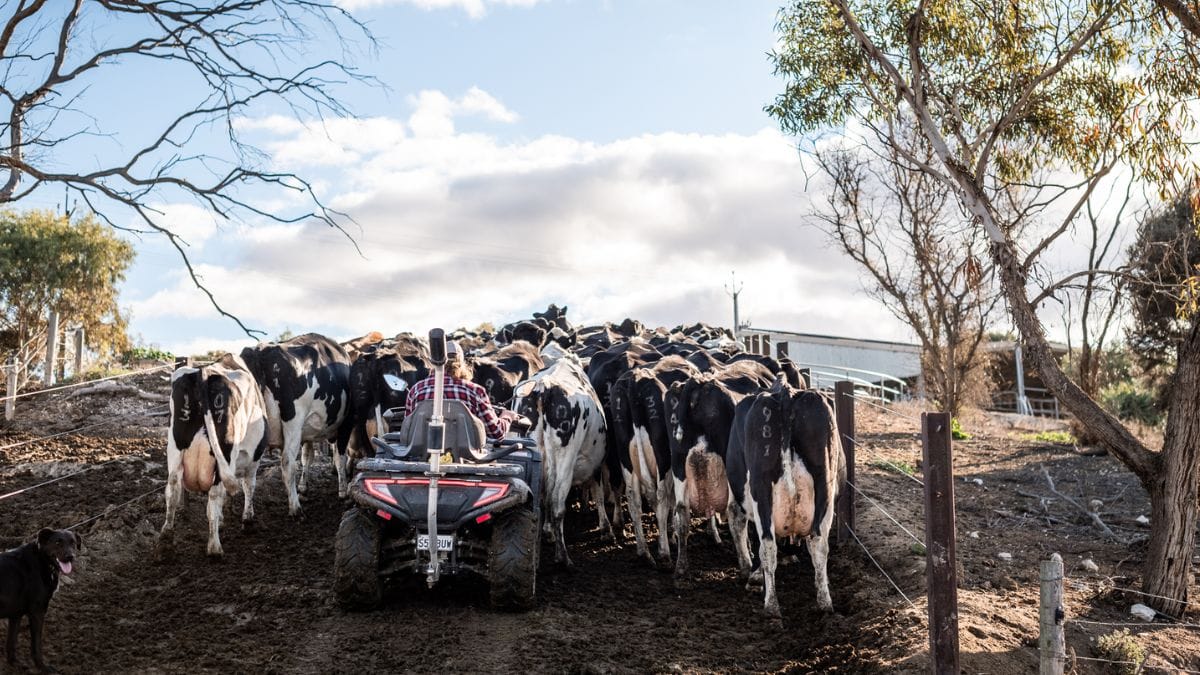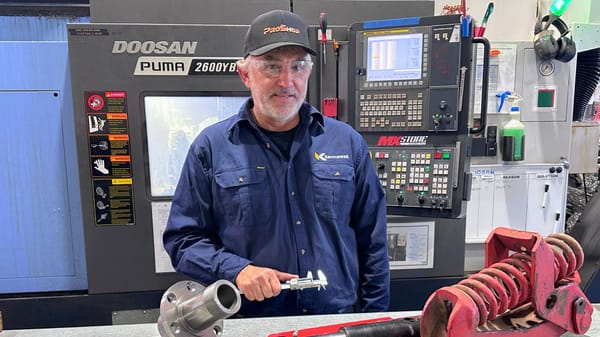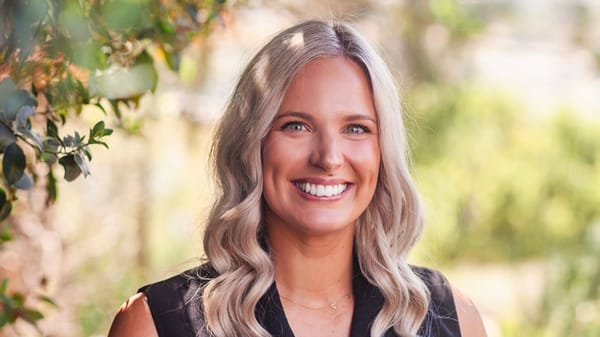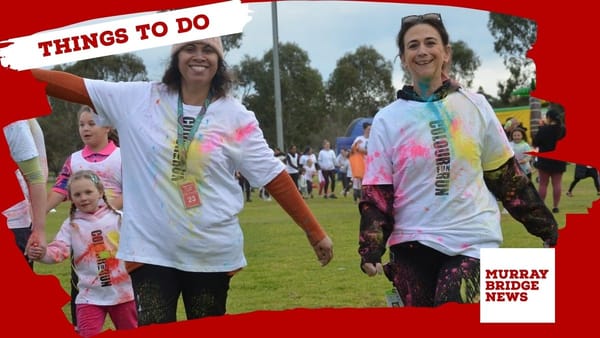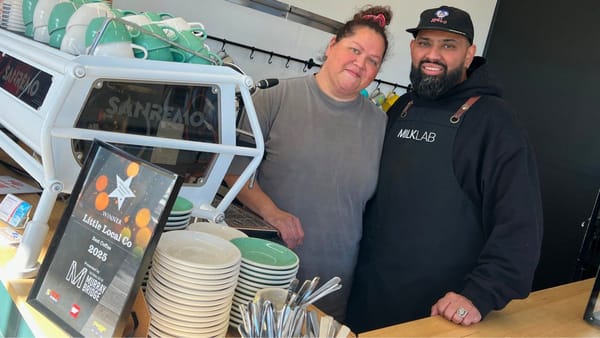Women of the LMRIA: Meet Jervois’ Kate Bartlett
She's a passionate traveler who returned to find her forever home on a dairy farm at Jervois.
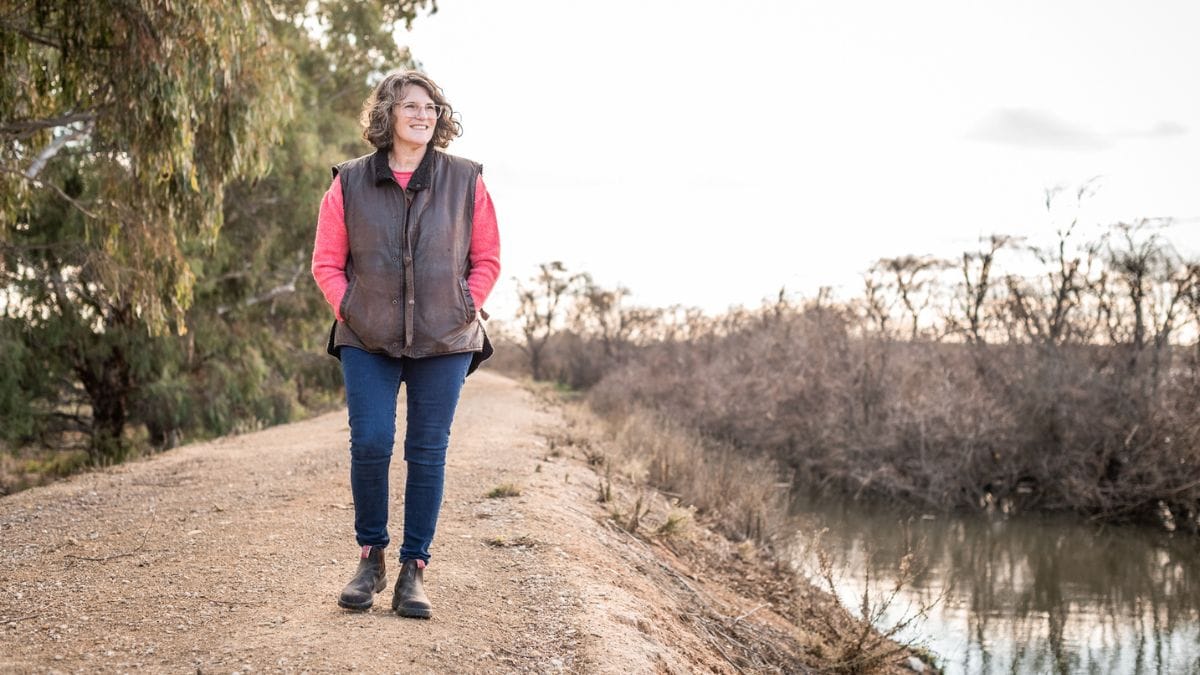
This story was contributed by Ellie Rankin.
The Lower Murray Reclaimed Irrigation Area (LMRIA) spans a stretch from Mannum to Wellington where you’ll find a mix of farming, including cropping, dairy, hay production and livestock.
In 2022, when the River Murray floods hit, farmers were confronted with difficult decisions: selling off their livestock, relocating them to higher ground, or arranging for agistment elsewhere, while watching their crops be destroyed by the rising water.
In the wake of these challenges, the women of the LMRIA came together and created a group to give each other support, all connected by their ties to farming along the Murray River.
Among them is Kate Bartlett.
Kate, her husband and their son run their dairy which has been in the Bartlett family for nearly 100 years.
Their dairy sits behind a 21-kilometre river levee.
During the floods there were a lot of unknowns, watching and waiting, knowing one little hole in the levee could change their lives for a year or more.
They saw other farmers’ land disappear as levees let go, homes being flooded, and lives changed forever.
Thankfully, although it came very close, their levee did not break and their land was not flooded.
Can you tell me a bit about yourself, your background and where you grew up?
I was born while my parents ran a dairy farm at Toora and am the oldest of two girls, with a sister, Kim.
My mother was a Kittelty and grew up on their family property at Mypolonga, and my father was born in Jervois and spent most of his youth there.
At 18 months old we moved into Murray Bridge, where I lived until I turned 18.
I moved to Adelaide and spent the next 10 years seeing Australia and the world, spending time in Melbourne, Darwin, London, and Europe.
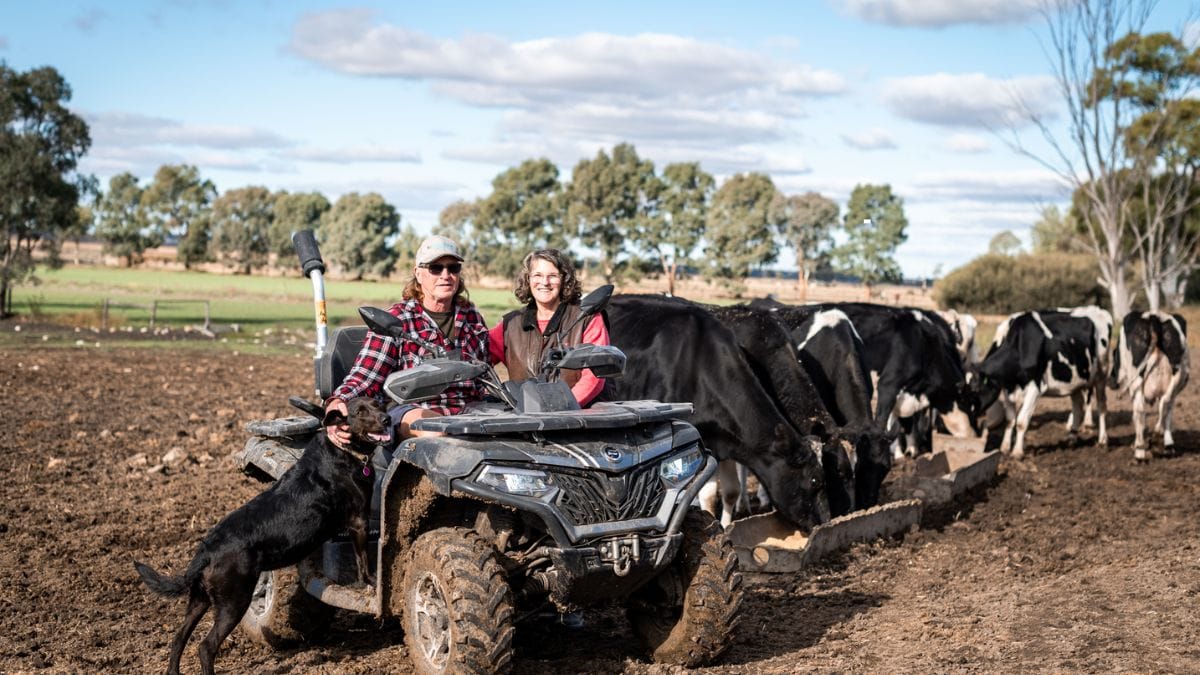
What led you to your current path?
After being away for 10 years, I came back to catch up with some friends and went to a Jervois footy game.
It was there I met the Jervois A grade ruckman and the rest is history!
Kym Bartlett was a third-generation dairy farmer on what is now property in the Jervois irrigation district.
His family has been farming this same section of land since around 1926, with each generation adding to the first soldier settlement block.
But me, how did I get to now?
Originally when I moved in with Kym I worked off-farm.
In 1999 Jesse – our first born – arrived but I continued my off-farm job, while doing the farm’s books.
In 2003 our daughter Tarsha arrived the same day our current "new" dairy building was started.
I tried to work off-farm but there was just too much happening and the juggling was too hard.
We ended 2003 with Kym’s parents retiring and the start of the LMRIA rehabilitation project being signed up.
During the following years we purchased the neighbours’ property, worked with only the odd Sunday not milking and we pushed through the Millenium Drought all while undertaking the LMRIA rehab project.
Team Bartlett, that’s what we call ourselves, had just the two of us for a number of years.
While I never milked a cow, Kym never talked to the bank, an accountant or went outside his farm fence, he also didn’t buy the tractors!
We really are a team, I love what I do towards our farm and so does Kym.
Farming was not really the full picture for me, and while I loved it, I did put my hand up and step outside the farm gate.
I sat on several dairy or water related boards, I attended meeting and did whatever I felt I could towards keeping our farming business healthy, successful and prosperous for the next generation.
I liked to understand what was happening in the dairy and water world and continued to ask questions until I did.
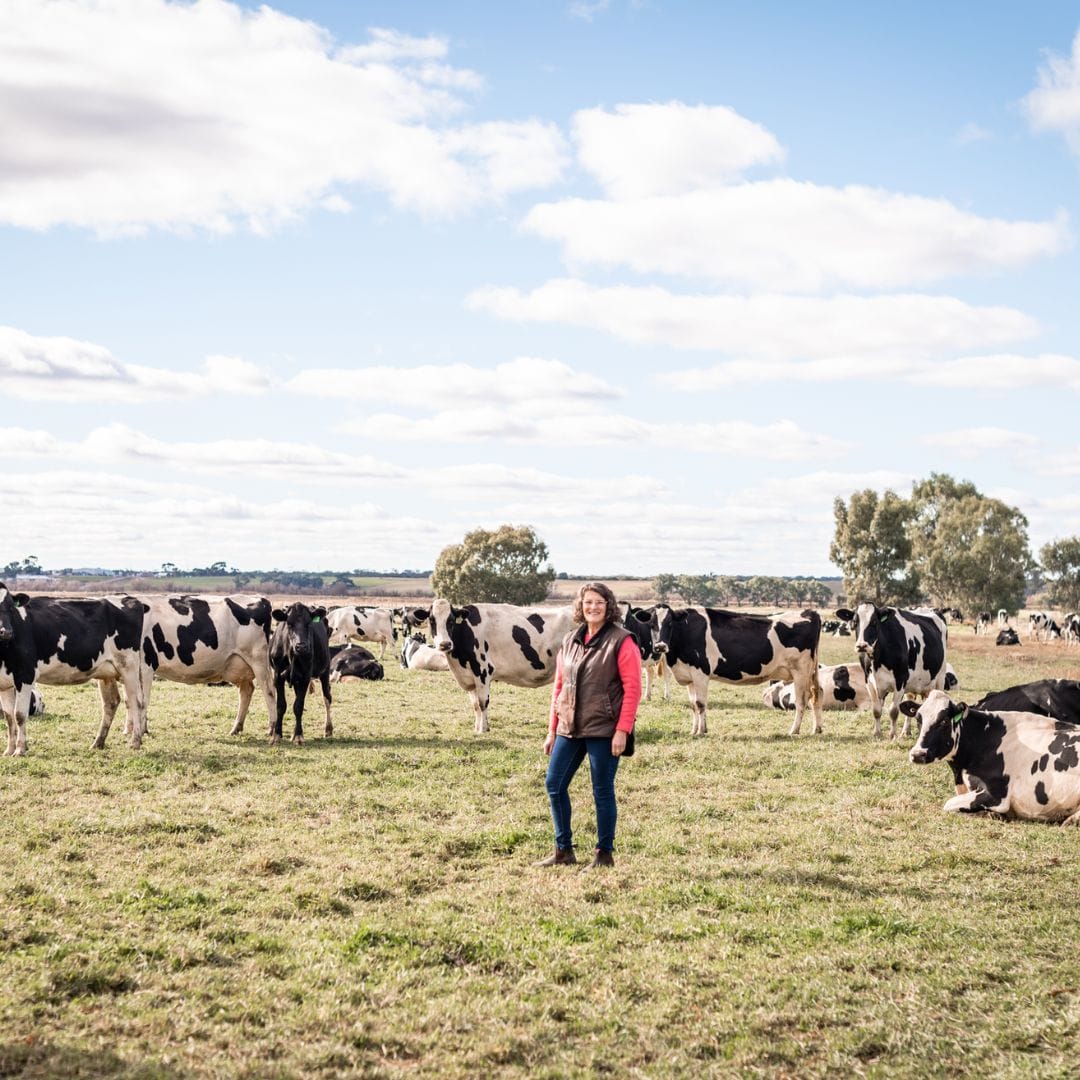
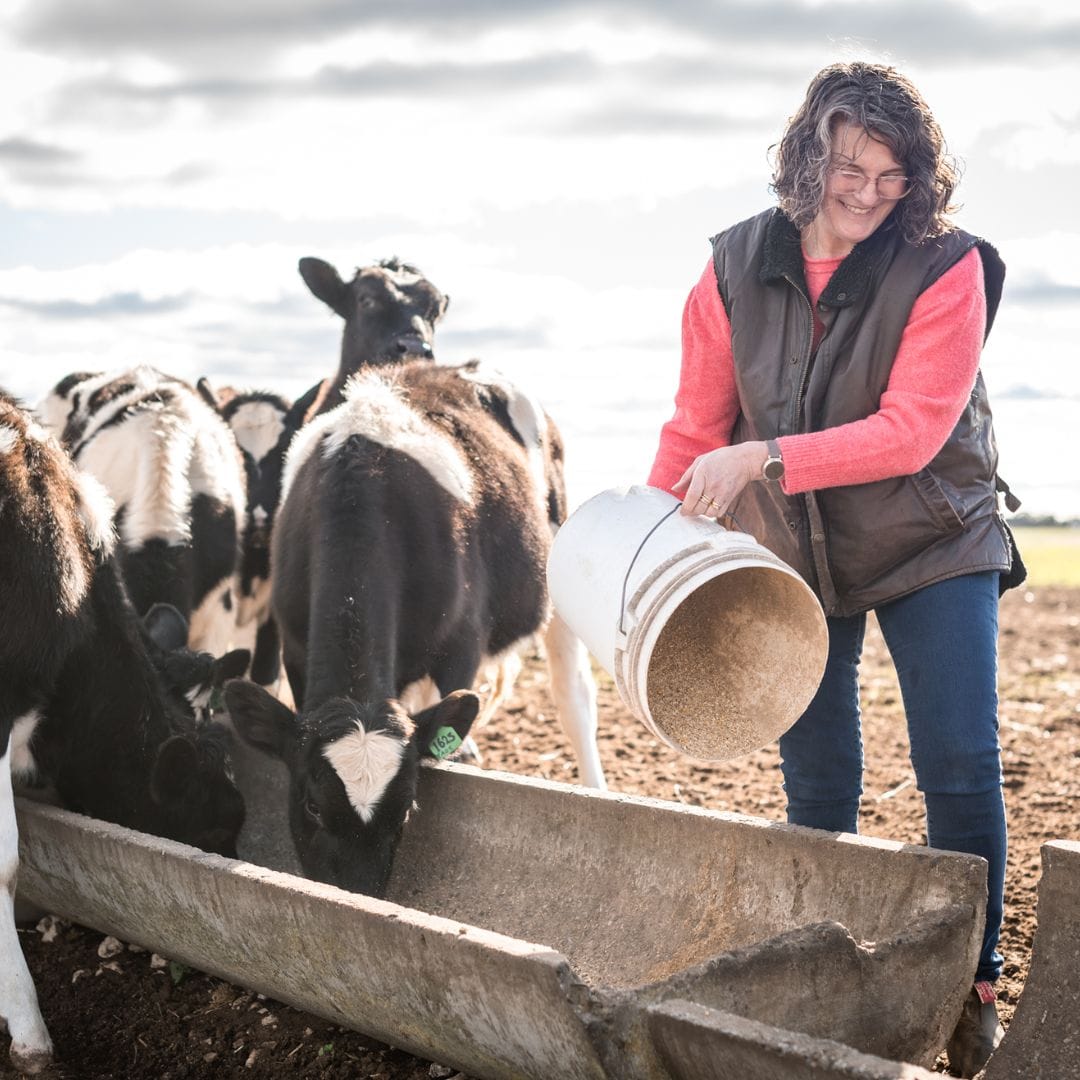
Kate had to step up when Kym suffered from a ripper achilles. Photo: Ellie Jade Photography.
How do you handle stress or difficult times in your life? What have you overcome?
In the Millenium drought I found walking, just me, my music and out in the fresh air.
When I realised I didn’t have enough time to walk, I started running and that has turned into a love-hate relationship.
While I do love it, my body does not always like it.
I also realise in hard times it’s important to share with others that are in the same situation.
While we bottle it up, at some point it does explode and it’s normally at the wrong person!
I also remember the day Kym ripped his achilles off the bone and spending close to three months on the couch.
I was proud of myself taking on full farm manager/worker role: bringing the cows up most mornings for the milkers, putting all the hay out, calves being bought to the dairy, running kids and also all my normal jobs.
I think I even mowed down crops for bailing.
I remember taking my son out to Mypolonga for a footy final only to realise on arriving the oval was empty, I had come to the wrong oval.
I turned around got him to the ground on time, then found a farmer and burst into tears.
That morning, I had jammed the hay cart and couldn’t get feed hay out or get it to move and I had no idea what to do.
The famer rang someone with a similar cart to ours and told them to go fix it for me!
Once Kym started trying to tell me how to do things I told him to shut up or get off the couch and do it!
I think it was at this same time the dairy feed system broke and I fixed it with bailing twine and duct tape.
I rang the service guy and said I needed repairs and he said he could get out in a few days, once I told him what was going on, he was out within hours.
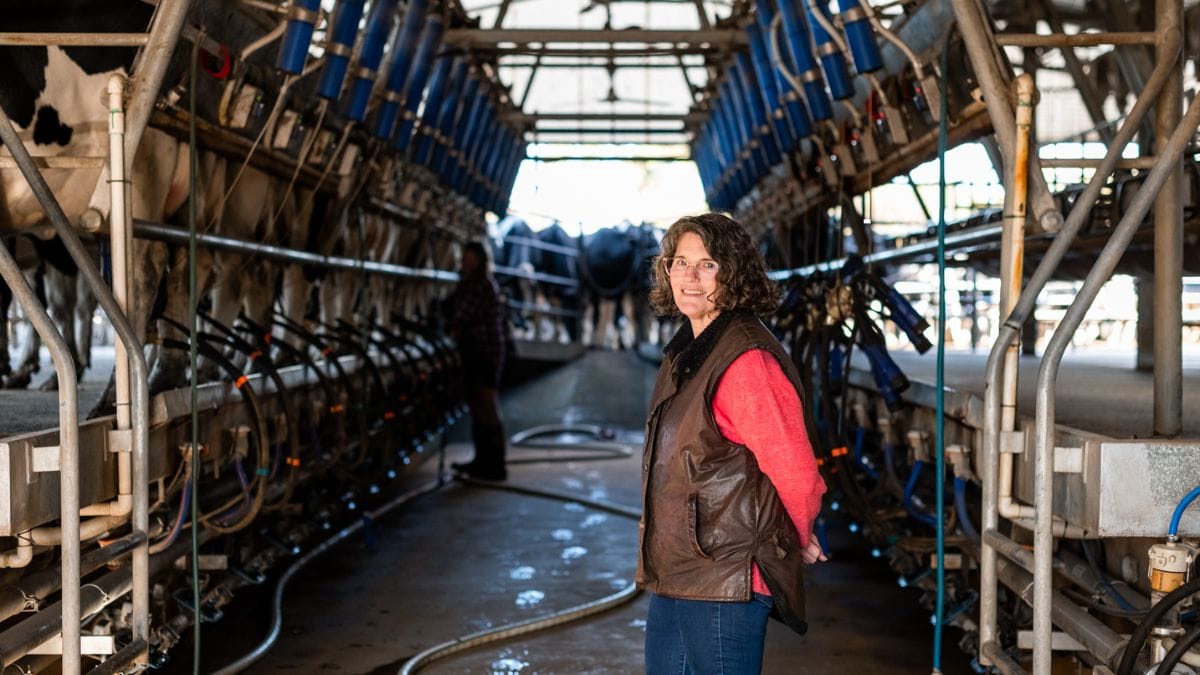
Can you share a memorable moment or achievement in your journey that has been particularly meaningful to you?
Farming-wise there have been a few.
During the Millennium drought we either won or placed top 3 in the Red Shy Farm Business of the year competing, for 5 straight years.
This kept us focused and let us know our KISS (Keep it simple stupid) system was working fine.
We moved the fence every day with no feed wagon and fed out hay.
It worked for us during the toughest of times.
On Australia Day 2023 I was asked to speak as a female farmer, who had grown up on the River Murray and talk about farming life for a river farmer.
Honestly, I’ve been very lucky, and also I’m not shy to share life as a dairy farmer, or life on the land with anyone.
I take every opportunity I am given to share what we do as farmers.
If people don’t hear from those on the land, living the life, they believe all the media they read which is normally far from the truth.
What is your favourite thing about being a rural woman?
Well, I love living in the country; waking to the kookaburras and hearing the silence at night.
I’ve never thought about being a rural woman, I’m just a female who lives in an area she loves, which happens to be the country.
What are your perspectives regarding the involvement of women in the rural industry?
I think dairying is very open to woman.
You see us in the boardroom, you see us in the tractors and you see us in the trucks going to get the fertilizer.
I never think of things being male or female, if you want to give it a go, go for it.
To me it’s more important to have the right person in a role, male or female, and support them.
I do remember hearing Pip Courtney speak about dairying and recognising in her speech, the amount of women stepping up in the dairy industry.
She believed the industry was probably the most accepting of females around the business and professional table.
I think any rural person needs to find their passion in the industry and work with it.
Be it water, staff or being in the dairy shed, find what you love and follow it through.
I have put my hand up for most things, given it a go, pulled out when it’s not gone the way I thought or it hasn’t been a good fit.
I attend most meetings, and workshops and believe while you might know most of it, as long as you walk out with one or two learning points you have done well.
In October 2022, with our son now working on the farm I went back to off farm work.
I was lucky enough to find a role that involves water, something I will never take for granted, and something that I want to see the future generations enjoy.
This has certainly made life extremely hectic, especially when it’s a busy time on the farm or when things don’t follow the plan but so far the juggling has worked.
When it doesn’t, or when I feel it’s no longer a good fit, I’ll happily step back to the my farming role.
